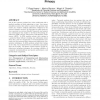Free Online Productivity Tools
i2Speak
i2Symbol
i2OCR
iTex2Img
iWeb2Print
iWeb2Shot
i2Type
iPdf2Split
iPdf2Merge
i2Bopomofo
i2Arabic
i2Style
i2Image
i2PDF
iLatex2Rtf
Sci2ools
145
Voted
IHI
2010
2010
Reliable medical recommendation systems with patient privacy
One of the concerns patients have when confronted with a medical condition is which physician to trust. Any recommendation system that seeks to answer this question must ensure any sensitive medical information collected by the system is properly secured. In this paper we codify these privacy concerns in a privacy-friendly framework and present two architectures that realize it: the Secure Processing Architecture (SPA) and the Anonymous Contributions Architecture (ACA). In SPA, patients submit their ratings in a protected form without revealing any information about their data, and the computation of recommendations proceeds over the protected data using secure multi-party computation techniques. In ACA, patients submit their ratings in the clear, but no link between a submission and patient data can be made. We discuss various aspects of both architectures including techniques for ensuring reliability of computed recommendations and system performance, and provide their comparison. C...
Architectures | Healthcare | IHI 2010 | Secure Multi-party Computation | Sensitive Medical Information |
Related Content
| Added | 18 May 2011 |
| Updated | 18 May 2011 |
| Type | Journal |
| Year | 2010 |
| Where | IHI |
| Authors | T. Ryan Hoens, Marina Blanton, Nitesh V. Chawla |
Comments (0)

